- Clone
- TL2.1 (See other available formats)
- Regulatory Status
- RUO
- Workshop
- HCDM listed
- Other Names
- Toll like receptor 2, TIL4, CD282
- Isotype
- Mouse IgG2a, κ
- Ave. Rating
- Submit a Review
- Product Citations
- publications
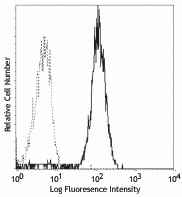
-

Human peripheral blood monocytes stained with TL2.1 FITC
| Cat # | Size | Price | Quantity Check Availability | Save | ||
|---|---|---|---|---|---|---|
| 309702 | 100 µg | 207€ | ||||
Toll-like receptors are type I transmembrane signaling receptors which are critical for the innate host defense to pathogens. Toll-like receptor 2 (TLR2), known as CD282, has been identified as a receptor that is central to the innate immune system's response to lipoproteins of Gram-negative bacteria and Gram-positive bacteria, as well as a receptor for peptidoglycan and lipoteichoic acid and other bacterial cell membrane products.
Product DetailsProduct Details
- Verified Reactivity
- Human
- Antibody Type
- Monoclonal
- Host Species
- Mouse
- Immunogen
- Human TLR2-transfected CHO cells
- Formulation
- Phosphate-buffered solution, pH 7.2, containing 0.09% sodium azide.
- Preparation
- The antibody was purified by affinity chromatography.
- Concentration
- 0.5 mg/ml
- Storage & Handling
- The antibody solution should be stored undiluted between 2°C and 8°C.
- Application
-
FC - Quality tested
Block, IHC-P, IHC-F, IP, WB - Reported in the literature, not verified in house - Recommended Usage
-
Each lot of this antibody is quality control tested by immunofluorescent staining with flow cytometric analysis. For flow cytometric staining, the suggested use of this reagent is ≤ 2.0 µg per million cells in 100 µl volume. It is recommended that the reagent be titrated for optimal performance for each application.
- Application Notes
-
The TL2.1 antibody is useful for blocking studies. It has been reported to block TLR2 agonist-induced cellular activation. Additional reported applications (for the relevant formats) include: inhibition of PGP activity and blocking of cytokine production1,3,7, immunoprecipitation1, immunohistochemistry of 4% paraformaldehyde-fixed frozen sections2 and immunohistochemistry of HOPE-fixed (HEPES-glutamic acid buffer-mediated organic solvent protection effect) paraffin-embedded sections4 , and Western blotting2. For highly sensitive assays, we recommend Ultra-LEAF™ purified antibody (Cat. No. 309716) (Endotoxin < 0.01 EU/µg, Azide-Free, 0.2 µm filtered).
-
Application References
(PubMed link indicates BioLegend citation) -
- Flo T, et al. 2000. J. Immunol. 164:2064.
- Faure E, et al. 2001. J. Immunol. 166:2018.
- Sugawara S, et al. 2001. Infect. Immun. 69:4951.
- Droemann D, et al. 2003. Histochem. Cell Biol. 119:103.
- Chavakis E, et al. 2007. Circ. Res. 100:204.PubMed
- Fiala M, et al. 2007. Proc. Natl. Acad. Sci. USA 10.1073/P. Natl. Acad. Sci. USA.0701267104.
- Goo SY, et al. 2007. J. Biol. Chem. doi:10.1074/jbc.M701876200.PubMed
- Weiss DJ,et al. 2008.J. Leukoc. Biol. 83:48. PubMed
- Harris, KM., et al. 2011. J. Leukoc Biol. 90:727. PubMed.
- Elass-Rocahrd E, et al. 2012. J Biol Chem. 287:34432. PubMed.
- Product Citations
-
- RRID
-
AB_314772 (BioLegend Cat. No. 309702)
Antigen Details
- Structure
- IL-1R superfamily, TLR family, type 1 transmembrane protein, 90 kD
- Distribution
-
Monocytes, granulocytes, endothelial and epithelial cells
- Function
- Activates innate host defense against bacterial pathogens
- Ligand/Receptor
- Microbial lipoproteins, peptidoglycans, lipoteichoic acid
- Cell Type
- Endothelial cells, Epithelial cells, Granulocytes, Monocytes, Neutrophils, Tregs
- Biology Area
- Cell Biology, Immunology, Innate Immunity, Neuroinflammation, Neuroscience, Neuroscience Cell Markers
- Molecular Family
- CD Molecules, Toll Like Receptors
- Antigen References
-
1. Lien E, et al. 1999. J. Biol. Chem. 274:33419.
2. Lien E, et al. 2001. J. Biol. Chem. 276:1873.
3. Sabroe I, et al. 2002. J. Immunol. 168:4701 - Gene ID
- 7097 View all products for this Gene ID
- UniProt
- View information about CD282 on UniProt.org
Related FAQs
Other Formats
View All CD282 Reagents Request Custom Conjugation| Description | Clone | Applications |
|---|---|---|
| Purified anti-human CD282 (TLR2) | TL2.1 | FC,Block,IHC-P,IHC-F,IP,WB |
| FITC anti-human CD282 (TLR2) | TL2.1 | FC |
| PE anti-human CD282 (TLR2) | TL2.1 | FC |
| Alexa Fluor® 488 anti-human CD282 (TLR2) | TL2.1 | FC |
| Alexa Fluor® 647 anti-human CD282 (TLR2) | TL2.1 | FC |
| Ultra-LEAF™ Purified anti-human CD282 (TLR2) | TL2.1 | FC,Block,IHC-P,IHC-F,IP,WB |
| APC anti-human CD282 (TLR2) | TL2.1 | FC |
| PE/Cyanine7 anti-human CD282 (TLR2) | TL2.1 | FC |
Customers Also Purchased
Compare Data Across All Formats
This data display is provided for general comparisons between formats.
Your actual data may vary due to variations in samples, target cells, instruments and their settings, staining conditions, and other factors.
If you need assistance with selecting the best format contact our expert technical support team.
-
Purified anti-human CD282 (TLR2)
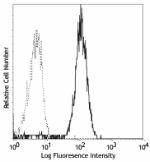
Human peripheral blood monocytes stained with TL2.1 FITC -
FITC anti-human CD282 (TLR2)

Human peripheral blood monocytes stained with TL2.1 FITC -
PE anti-human CD282 (TLR2)
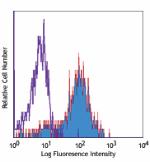
Human peripheral blood monocytes stained with TL2.1 PE -
Alexa Fluor® 488 anti-human CD282 (TLR2)
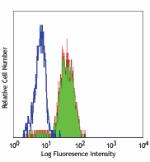
Human peripheral blood monocytes stained with TL2.1 Alexa Fl... -
Alexa Fluor® 647 anti-human CD282 (TLR2)
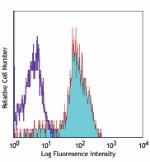
Human peripheral blood monocytes stained with TL2.1 Alexa Fl... -
Ultra-LEAF™ Purified anti-human CD282 (TLR2)

Human peripheral blood monocytes stained with TL2.1 FITC -
APC anti-human CD282 (TLR2)
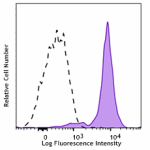
Human peripheral blood monocytes were stained with CD282 (TL... -
PE/Cyanine7 anti-human CD282 (TLR2)
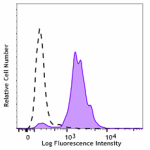
Human peripheral blood monocytes were stained with anti-huma...

 Login / Register
Login / Register 





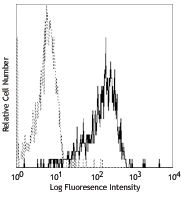
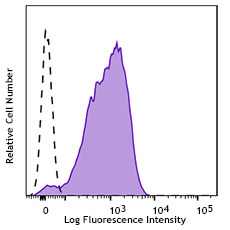
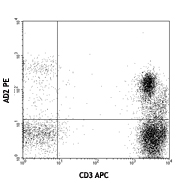
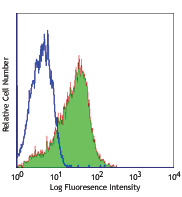



Follow Us